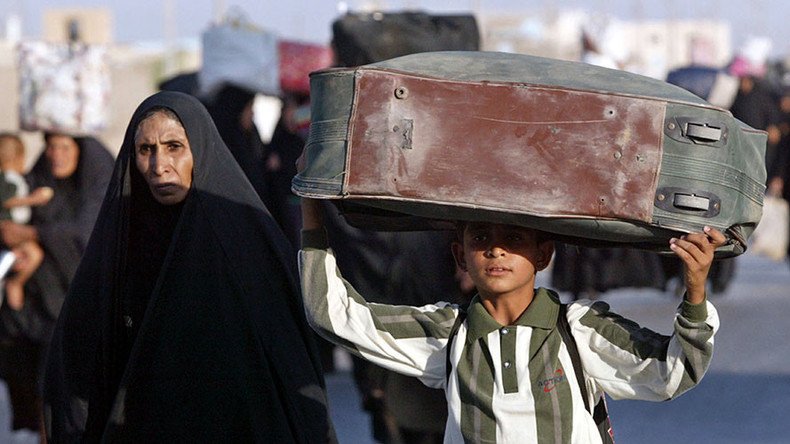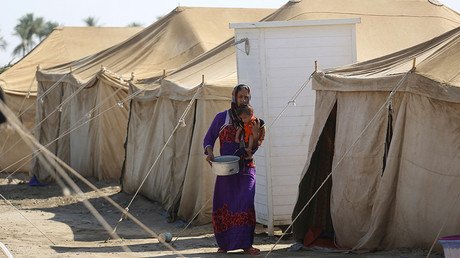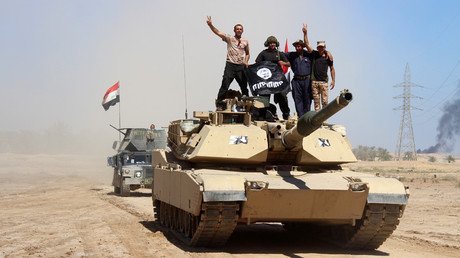Iraq may soon reach 'point beyond repair,' 8mn people need humanitarian aid – report

The vulnerability of internally-displaced people (IDPs) in Iraq has reached boiling point, with the situation aggravated by ongoing armed conflict. If diverse ethnic communities fail to co-exist, Iraq may soon be “beyond repair," a new report warns.
There are currently 3.2 million IDPs in Iraq, which is in the middle of a war with Islamic State (IS, formerly ISIS/ISIL). More than 8 million people there are in need of humanitarian assistance, the report from the Minority Rights Group International (MRG) and partner charity Ceasefire Center for Civilian Rights has stated
"In the context of limited governance and continued insecurity, the opportunity afforded by the retaking of territory from ISIS is being lost," the report said.
With population movements and territorial control shifting between armed groups, host communities and authorities are under greater pressure, the human rights watchdog noted, adding that intimidation and harassment of IDPs based on their origins are "common and increasing" in areas of displacement. "Communities who find themselves in areas where they are a religious, ethnic or linguistic minority live in fear of physical assault and discrimination."
Protection of IDPs in Iraq has become next to impossible due to the "collapse of the rule of law, widespread impunity, territorial or tribal disputes and the inability or sometimes unwillingness of the Iraqi government and KRG [the Regional Government of Kurdistan] to respond to the sheer scale of the crises," the report noted.
“If communities are unable to co-exist, Iraq may soon reach a point beyond repair," it added.
IDPs originating from Anbar – the Sunni heartland of Iraq – comprise the largest group of displaced people in Iraq. With 1.4 million displaced throughout the country, approximately 40 percent are residing within the governorate itself, according to the report.
But IS abuses of the Anbar population have received little attention mainly "because of their expected support of, and perceived coexistence with the group." Meanwhile, according to the human rights watchdog, "anecdotal evidence and witnesses among the IDP population indicate serious hardships imposed on the civilian population." Apart from individuals who actively support the armed groups, "stayees [sic] in Anbar are mostly families who simply don't have the ability to leave, including widowed women, farmers who are no longer able to work their lands, shopkeepers whose businesses have been taken control of by ISIS, or heads of households on government payroll who are not receiving their salaries," the report said.
READ MORE: Life after ISIS: RT travels to recently liberated town of Kabisa, Iraq (EXCLUSIVE)
As IS established control throughout Anbar in 2014, displacements followed with greater frequency, either due to fear of bombing or shelling from government forces, direct clashes between armed groups or persecution by the jihadists, the report added.
The Iraqi capital, Baghdad, hosts the second largest IDP population of nearly 600,000 persons, mainly originating from the governorates of Anbar, Salahaddin and Ninewa. Most families are renting houses or living with host families, some are housed in formal or informal camp settlements throughout the governorate.
“In Baghdad, IDPs from Anbar are badly treated and risk being harassed and abducted while moving around the city. Many suffer maltreatment, not only from militias but also from public officials," the report said.
The number of internally displaced people in Kirkuk, a highly volatile northern region with long-standing inter-community conflicts between Arabs, Kurds, Turkmens and Assyrians, has reached 370,000, the human rights group said. More are expected as government forces and affiliated militias are targeting the IS-controlled district of Hawija in southwest Kirkuk.
In July 2015, the local governor declared that IDPs originating from Diyala (a governorate in eastern Iraq) were obliged to return as the province had been liberated. Families were given a month to leave and, although few direct expulsions have been seen, "indirect methods are used to force families out of Kirkuk. For example, IDPs’ identification documents are confiscated by the Asayish and families are told they will only get them back at the checkpoint when they leave," the report said.
Although Diyala was liberated in late January 2015, the province remains subject "to continuous attacks from ISIS sleeper cells" in cities like Baquba and Muqdadiya, the report said. The attacks tend to spur retaliation by Shi’a militias targeting Sunnis, supposedly affiliated to IS. However, local residents claim that there is no consistency in who is targeted. One IDP told the human rights watchdog: "Revenge is carried out on whoever crosses their [the militias’] path."
The authors of the report sound the alarm that post-liberation strategies are urgently required, especially those aimed at reconciliation, community building and re-establishing the rule of law.
"The vast majority of Iraq's ... IDPs are being denied the possibility of returning to their homes, despite the fact that many of them have been liberated," the executive director of the Minority Rights Group International, Mark Lattimer, told Al Jazeera.
"Unless a coherent strategy for return and reconciliation is put in place, the possibility of a democratic, multicultural Iraq will be gone within the next few years," he added.














